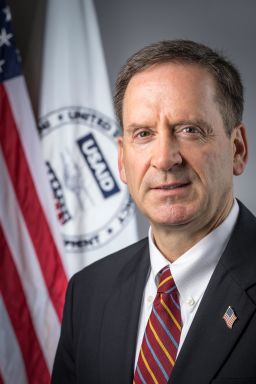Editor’s Note: Mark A. Green is the administrator of the United States Agency for International Development. The opinions expressed in this commentary are his own; view more opinion articles on CNN.
This week, I was in the Democratic Republic of the Congo (DRC), where the deadly Ebola virus has killed nearly 2,000 people, prompting the World Health Organization (WHO) to declare a public health emergency of international concern. The WHO has been hard at work leading the world’s response to this crisis. This is the second-largest Ebola outbreak in history, and requires a robust, unified international response that goes far beyond the medical treatment of the disease’s victims.

The United States has been the world’s largest single-country donor to this crisis, with USAID contributing $136 million and other agencies providing extensive technical assistance since the outbreak began last year. We are working closely with the WHO and the international community, armed with the lessons learned and innovations developed during the 2014 West Africa Ebola outbreak.
As administrator of the United States Agency for International Development (USAID), and with support across the Trump administration, I deployed an elite disaster team to the DRC, comprising experts from USAID and the Department of Health and Human Services’ Centers for Disease Control and Prevention.
At the heart of the challenge to contain and cure the disease is pervasive insecurity and community distrust.
Numerous conflicts and acts of violence, particularly in North Kivu and Ituri Provinces, hinder access to medical professionals and disrupt response operations. Some of the perpetrators are armed gangs vying for control of land and resources; some are extremists attempting to render areas ungovernable or to send political messages.
But the insecurity runs still deeper. Decades of corrupt, authoritarian rule during which communities were denied any meaningful voice in their government have undermined the Congolese people’s trust in institutions. People living in desperate poverty have watched kleptocrats enrich themselves by selling off natural resources and diverting funds away from those in greatest need.
This has fueled sweeping distrust of outsiders – including, too often, heroic health care workers who are trying to manage the Ebola response. In order to enable the public health response to work effectively, the community distrust of domestic institutions and outside assistance must be addressed.
To start, the United States urges all parties to more earnestly engage nongovernmental organizations already on the ground in Eastern DRC, many of whom are trusted community health care providers and must be integrated into the broader Ebola response.
We also call for greater transparency from everyone involved in the response with respect to both data sharing and expenditures of funds, an effort that will increase buy-in from local communities and prospective donors. Additionally, we will continue to push for health workers to have all the tools they need to fight the disease. That includes deploying a robust vaccine strategy in at-risk areas of the DRC and in communities along the country’s borders.
We will also call on other bilateral donors to do their part. The United States and the United Kingdom have been generous in supporting the WHO’s efforts. The World Bank has also come through with significant resources. Others need to step up, and step up fast.
The elite team already on the ground has supported vaccination campaigns, helped to improve laboratory diagnostics and assisted with testing and contact tracing.
We have also facilitated significant community engagement campaigns, which were key to ending the 2014 West Africa outbreak, including provisions for “safe and dignified burial” teams to minimize unsafe contact with remains that might still be infectious.
This week, the US Ambassador to the DRC Mike Hammer and I met with officials from the government of the DRC, urging immediate action to address the underlying issues impeding efforts to end the Ebola outbreak.
We welcome DRC President Felix Tshisekedi’s efforts to forge a strong partnership with the United States government, while recognizing the need to undertake significant political and security reforms that will renew hope in the population for a more responsive relationship with the central government. President Tshisekedi’s visits to the Ebola-affected region and recent steps by DRC’s Ebola coordinator, Dr. Jean Jacques Muyembe, to improve coordination with the many stakeholders involved in the response are promising signs that the government of the DRC will continue to prioritize attention to the outbreak.
We are far from containing this disease, but, as the recently appointed United Nations Emergency Ebola Response Coordinator David Gressly has said, despite all the challenges we face, nothing is insurmountable. I agree, but know that long, difficult months are ahead.

